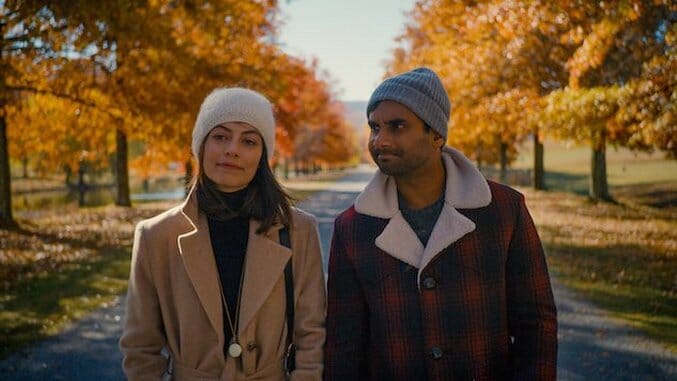Master of None, TV’s Most Perfectly Curated Comedy
Photo courtesy of Netflix
Its points of reference are impeccable: Bicycle Thieves and L’Avventura, David Bowie and D’Angelo, craft cocktails in Manhattan and homemade pastas in Modena. Its style is, too: white linen suits at a summer wedding and a pair of red Vespas on a sun-splashed lane, the careful symmetries of fall foliage at Storm King and winter’s first snowstorm, clear of the clutter of other people’s lives. But Netflix’s Master of None, in which Dev (co-creator Aziz Ansari) and Arnold (Eric Wareheim) plan dates down to the perfect wine and rehearse conversations with women as if running lines from a script, is not a series in which form follows function—at least not until the second season’s last image, erasing the heartache at the final episode’s core. In this, Master of None is a gorgeous, often delightful romance that still doesn’t quite know where it stands on the subject: a perfectly curated comedy about the perils of living a perfectly curated life.
Returning to New York after a restorative stint in north central Italy, Dev endeavors to resume that life as if his relationship with Rachel (Noël Wells) had never happened, and for time he appears to succeed. He forms a partnership with the impresario known as Chef Jeff (Bobby Cannavale, channeling Anthony Bourdain), signing on to host a Cupcake Wars-style competition; he returns again and again to the same restaurant, the same bar, with a series of women, in the at once daring and deadening “First Dates.” Splicing together these exchanges until it becomes as much about the template of the first date as it does about any one in particular, the episode is an emblem of Master of None’s frustrating second season: Its structure is ingenious, capturing the “modern” in “modern romance” with excruciating exactitude, but the women across the table are reduced to their eccentricities—one drones on about wrestling; another retreats to the restroom for a line of cocaine—mere projections of Dev’s lovelorn disappointment. It’s as if they’re a muffled signal from the not-so-distant future, in which Dev pines for Francesca (the charming Alessandra Mastronardi) during her own stint in New York: In matters of the heart, there is no “right” dish, no “right” song, that can replace understanding where the other person is coming from.
It’s not that Ansari and co-creator Alan Yang aren’t occasional masters of this empathic streak. The season’s most distinctive episodes, “New York, I Love You” and “Thanksgiving,” delve into the lives of a doorman, a deaf woman, a Burundian cab driver and Dev’s longtime friend, Denise (Lena Waithe), using narrative structures as inventive as that of “First Dates” to offer sublime treatments of relationships more complicated than curated. The production design itself shifts here from Dev and Arnold’s considered cool to the warm, careworn filaments of the unfiltered life: “New York, I Love You” turns on the near-theft of a hideous scarf and the sounds of a dreadful club tune; “Thanksgiving,” set in Denise’s childhood home, suggests the comforting tempo of tradition, the assurance, if we’re lucky, that we’ll sit at the same table with the same people, eating the same dishes, year after year after year.
-

-

-

-

-

-

-

-

-

-

-

-

-

-

-

-

-

-

-

-

-

-

-

-

-

-

-

-

-

-

-

-

-

-

-

-

-

-

-

-








































